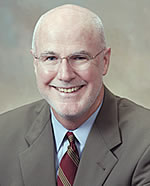Study shows racial disparities in lung cancer treatment

Dr. Paul Walker
GREENVILLE, N.C. — A new study that looks at newly diagnosed lung cancer patients and follows them after diagnosis is one of the first to give reasons why patients don’t undergo lung surgery and why surgery occurs less often in blacks.
Researchers found that when blacks had two or more additional medical conditions, they rarely had surgeries, only about four out of 100, whereas white patients in the same situation had surgery just as often as if they didn’t have those conditions.
In addition, when black patients did not have a regular source of care, such as a primary care doctor, physicians recommended surgery only one-fifth as often as they did with whites who had no primary care doctor.
The study was composed of patients and physicians at five medical centers in North and South Carolina, including the Leo W. Jenkins Cancer Center at the Brody School of Medicine at East Carolina University. It was led by researchers at the University of North Carolina at Chapel Hill and published in the June 16 issue of the Journal of the American Medical Association.
“African-Americans have a poorer outcome in lung cancer because they get less treatment,” said Dr. Paul Walker, a study co-author and director of the thoracic oncology clinic at the Leo W. Jenkins Cancer Center. “If and when they get the same treatment as Caucasians, the outcome is the same.”
Among patients newly diagnosed with early-stage lung cancer, surgery to remove the diseased portion of lung is the only reliable cure, researchers said. With surgery, at least half will survive more than four years. Without it, most will die within a year.
“This study is the first study to delve into the reasons why African-Americans get less treatment,” Walker said. “Based upon this study, the reason is surprising. It is not the system or the patient. It is the physician. Physicians view African-Americans differently than Caucasians.”
The study analyzes data from 386 lung cancer patients. Each study participant, at the time of diagnosis, answered a 106-item survey that included questions about their demographics, perceptions of patient-physician communication, perceived certainty of diagnosis, attitudes about lung cancer, religiosity, past health care experiences, access to a regular source of care (such as a primary care doctor) and their medical decision-makers (such as a spouse, child or spiritual advisor).
In addition, researchers reviewed the medical charts of each patient to see if the patient received surgery within four months of study enrollment.
The results show that 66 percent of white patients had surgery, compared to 55 percent of black patients. Surgical rates for blacks were especially low when they had two or more additional illnesses or lacked a regular source of care. For blacks with an additional illness, the surgical rate was 13 percent, compared to 62 percent among black patients without other illnesses. When blacks lacked a regular source of care, their surgical rate was 42 percent, compared to 57 percent for blacks with regular care.
These results suggest that there may be thousands of black patients with lung cancer in the United States who should be getting surgery but aren’t, researchers said. The differences in care go beyond what can be explained by differences between blacks and whites in health insurance, education and income, they said.
To correct this disparity, researchers said, physicians need to look at cases where black patients with lung cancer have been steered away from surgery. In such cases, doctors should push for second opinions or other fail-safe mechanisms. Researchers also recommended improvements in electronic medical records to better track patients and their treatments.
“This simple recognition and awareness that we can’t blame the system or the patient for the racial disparity in the treatment of lung cancer, but we as physicians have to look in the mirror, will hopefully change our perspective and change this poorer outcome,” Walker said. “It is not a racial bias in my opinion but it is a medical perspective bias of viewing medical issues and clues differently in African-Americans than Caucasians. It has opened my eyes that when I see the same things in African-Americans as Caucasians, I have a different clinical sense of that impact on their tolerance of treatment.”
Better care management, communication and patient education are also important, researchers said.
In addition to researchers at UNC and ECU, physicians from Charlotte and Charleston, S.C., also participated. The study was funded by the American Cancer Society.
Researchers plan to further analyze their data to see if differences exist across institutions based upon the makeup of each institution’s lung cancer programs. They also plan an intervention study to focus on changing physicians’ medical sense and perspectives of African-Americans in lung cancer treatment, Walker said.